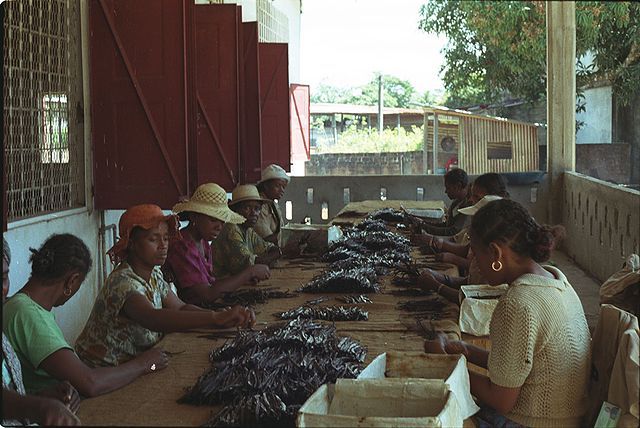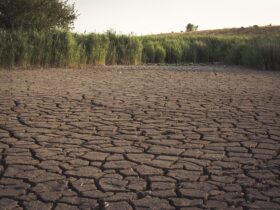Many Californians start each morning with an iced vanilla coffee or a bowl of vanilla-flavored oatmeal. Vanilla has become vital to daily life — whether it is a part of meals, skin care routines, or perfume.
For the producers of vanilla, however, it’s more than something that belongs in an ice cream cone or in a coffee mug. Vanilla production and extraction compromise their livelihoods as they work day through night on the fields. Both processes are a threat to farmers’ survival.
A large number of developing countries’ economies depend on trade with developed nations of commodities such as vanilla beans, minerals, copper, and oil. However, this has created a heavy burden on both the producers of these goods and the country’s economy; resource extraction has become resource exploitation, subsequently creating economic instability across the globe.
Consequently, due to price inflation, lack of infrastructure and poor economic scores, trade-dependent export economies can suffer from instability, which could instigate human and labor rights issues. This then would lead to poor quality of life, faltering economies and political unrest.
For a country like Madagascar that is an agricultural-based economy and where 80% of the world’s vanilla comes from, economic and political stability depends on the demand of booming countries. In other words, when countries like the United States, France, Germany, etc. feel like they prefer real vanilla, prices will go up; however, when they prefer artificial flavoring, prices and demand decrease.
Hence, this presents the explanation for the rising or plummeting prices of vanilla by over 20% in just a few weeks. While there is an explanation for the price volatility, it does not make the lives of farmers any easier.
Vanilla farmers like Beni Odon report that life quality is improved when the prices of goods, such as vanilla, are high. In contrast, conditions are poor when the price of vanilla is low. The fact that Madagascar’s economy is so dependent on other countries’ desires creates uncertainty for the political, civil and economic state of a country. In Madagascar, farmers would have to sleep with their crops, even going so far as to bear some type of defense weapon in order to protect the source of their profit.
Given the dire circumstances, what is the primary motivation behind such actions? Demand is so high that farmers are afraid to lose out on any possibility of making money and supporting themselves.This translates to farmers quite literally fighting for their livelihoods and jobs. In addition to this, problems like violence, vigilante justice and even poor harvest (because of premature harvest due to fear of scarcity or violence) become prevalent.
As exemplified by Madagascar, the problem goes beyond price fluctuations, lack of infrastructure and the finite availability of resources. The overarching issue is that the economies of these countries depend on other nations. As demand increases in these affluent import countries, developing countries seek to match it with increased supply. This comes at the expense of producers and workers who experience human and labor rights violations, oppression from governments and the constant fear of an otherwise crippling economy.
The rapid increase from $80.00 per kilogram in 2014 to $600.00 per kilogram in 2017 and around $425 in 2022 is a quantitative indicator of the farmers’ quality of life. When Madagascar seems to be booming, one can presume that vanilla is a popular crop. When a decrease in the economy is seen, vanilla has lost its appeal.
This economic fluctuation is correlated with governments having a poor relationship with the agriculture industry. Consequently, this relationship negatively impacts its people.
This, however, isn’t unique to Madagascar. Chile, now one of Latin America’s most economically flourishing countries, once experienced civil unrest (in the 90s and again in 2019) due to the economic instability rooted in the subsidence of copper — its most important trade good.
The issue of resource exploitation extends far beyond just Madagascar and Chile. It appears in nearly every continent of the world. From avocados in Mexico to tobacco in Moldova, to timber in Cambodia and crude oil in Syria, the examples are vast.
Developing nations are often barred from achieving economic prosperity due to their limited and inequitable trade practices with powerful countries that take much and give too little in return. In turn, these nations are lured by global superpowers, like the United States, into trade that is only attractive for short-term growth.
However, solving this problem is not impossible. The solution lies in switching from a largely resource-centered and trade-based economy to a more diversified economy.
While the civil unrest in Chile might be due to the subsidence of copper, Chile’s case exemplifies how moving away from mass extraction can immensely improve the limited prosperity of developing countries. The explanation lies behind the fact that resource extraction is fickle, which then creates unrest.
However, Chile, now operating with an open economy, is able to limit the detrimental impacts of relying on one trade resource and one wealthy trading partner. Such flexibility has propelled Chile’s GDP per capita to 40%, which makes Chile’s GDP the highest in Latin America.
Central to Chile’s success has been its bold and strategic investment in different industries — such as renewable energy and technology — helping promote entrepreneurship and small business ventures to further support the average citizen. The Chilean path to success can be imitated by nations across the world. Countries can slowly reduce their dependence on trade of popular resources, and instead diversify industries, trading partners and goods.
While developing nations have to ensure that they are making smart decisions, the role that companies and consumers play in developed nations is also crucial. This is not to suggest that it is necessary to boycott commodity imports from countries like Madagascar or Chile — this action will only hurt these producers and nations. Rather, multinational corporations and consumers have a responsibility to combat human and civil rights violations by demanding increased transparency of the production process behind the goods they sell.





